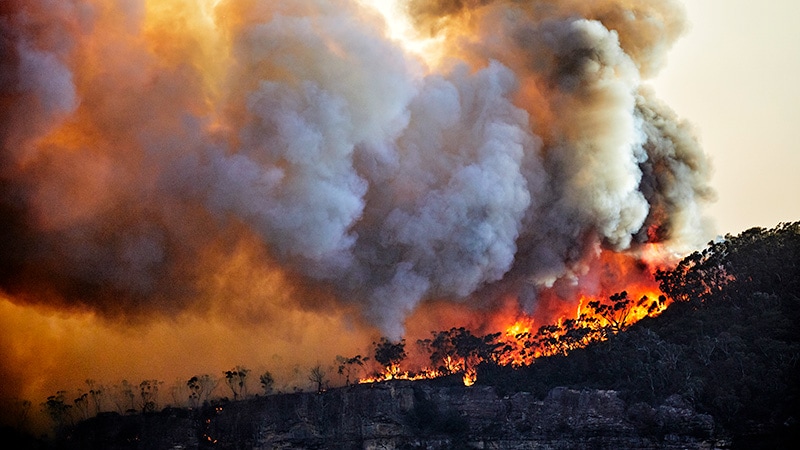Extreme heat, wildfires, and particulate matter not from wildfires were the most studied climate issues in conjunction with increased respiratory care, based on data from more than 60 studies.
Previous research has shown that fossil fuel combustion and climate change are threats to respiratory health, but the direct impact of climate on respiratory healthcare has not been well studied, wrote Jacqueline R. Lewy, MD, who led the study while a 4th-year medical student at the University of Michigan, Ann Arbor, Michigan.
Recent local events prompted Lewy and colleagues to examine the current landscape of climate change studies and respiratory healthcare.
“Last summer, when Canadian wildfire smoke enveloped the Midwest and the East Coast, patients presented with exacerbations of asthma and COPD to our clinics,” said corresponding author Alexander S. Rabin, MD, of the University of Michigan, Ann Arbor, in an interview.
“The event was a reminder of the increasing health threats that our most vulnerable patients face from climate change,” he said. “The smoke events also got us thinking about how health systems around the world are preparing, and we wanted to better understand what is known about the impacts of climate change on healthcare delivery to patients with lung disease and look for blind spots in the research,” he explained.
In the review, published in The Journal of Climate Change and Health, the researchers identified 67 studies related to climate and respiratory care; 50 of these were published between 2020 and 2023.
The most frequently studied climate and weather topics were extreme heat (31 studies), particulate matter not from wildfires (22 studies), and wildfires (19 studies).
The most common respiratory-related outcomes were respiratory-related hospital admissions (33 studies) and respiratory-related emergency department (ED) visits (24 studies).
Few studies addressed the potential impact of climate on telehealth, facility energy distribution, and pharmaceutical supplies, the researchers wrote. Notably, only one study in the review showed an association between power outages in New York City and higher chronic obstructive pulmonary disease (COPD)-related hospital admission rates, and no primary research emerged on the effects of climate change on respiratory medicine supply or distribution, they said.
Findings from studies with demographic breakdowns included evidence of greater effects of extreme weather on elderly populations compared with younger groups, and data from the seven studies focused on children showed a particular risk for climate-related respiratory exacerbations among those younger than 5 years.
The findings of the review were limited by several factors including the targeted article selection and potential misclassification bias, as respiratory outcomes often overlapped with cardiac or other outcomes, the researchers noted.
However, the results highlighted three key areas for future research. First, more studies are needed on the impact of climate on understudied populations in areas such as Africa, South America, Asia, and the Caribbean. Second, studies are needed on the impact of climate on respiratory care beyond acute care, with attention to primary and specialty respiratory care use, supply chain impacts, and effects on long-term pulmonary care and rehabilitation. Finally, more research is needed to explore solutions to the increased demands on pulmonary care in the context of climate change, including the use of telehealth, the authors wrote.
Limitations and Research Gaps
“While we found extensive published research chronicling the acute respiratory health impacts of climate change and extreme weather, such as heat waves and wildfires, we were surprised to find few studies on health system adaptation,” Rabin told Medscape Medical News.
“Although we know that prevention and long-term disease management are critical, studies looking at primary care impacts on respiratory care, healthcare infrastructure hardening, and medication supply chain resilience were largely absent from the literature,” he said. “We were further struck by the limited amount of research originating from the most climate-affected areas such as in the Global South, where outdoor air pollution already results in over 4 million deaths per year,” he noted.
Although clinicians increasingly recognize that climate change and extreme weather threaten lung health, solutions are needed to make health systems resilient, accessible, and adaptable, especially with the likely increase in demand for respiratory care, Rabin emphasized.
More research is needed on preventive measures that could mitigate the risk for bad air quality, heat, and other extreme climate change events on vulnerable populations, Rabin told Medscape Medical News. “Every domain of healthcare delivery, from pharmaceutical procurement to hospital heating and cooling system design, must account for these environmental changes,” he said. “More collaboration is needed with researchers and clinicians in areas of the world that are underrepresented and underresourced to help share knowledge and tools to build health system resilience,” he added.
Takeaways and Next Steps
“I was struck by how many studies used healthcare metrics as a way to measure health outcomes but not to measure resilience and efficiency of healthcare systems themselves,” said lead author Lewy, in an interview. “For example, many studies used ED visits or hospital admissions as ways to measure severity of disease associated with a climate event, but the strain that increased visits or admissions have on healthcare systems was barely mentioned,” she noted.
Looking ahead, more studies that focus specifically on infrastructure as it relates to healthcare would be valuable, said Lewy. Recent research has explored virtual care as a way to mitigate climate change-associated COPD exacerbations, but virtual care may not be reliably accessible in cases of the widespread power and network outages that often accompany storms, heat waves, and other catastrophic weather events, she noted. “More research into these types of logistical factors affecting healthcare systems would be helpful,” she added.
Rabin disclosed support for the study from the US Department of Veterans Affairs but had no other financial conflicts to disclose. Lewy had no financial conflicts to disclose.










